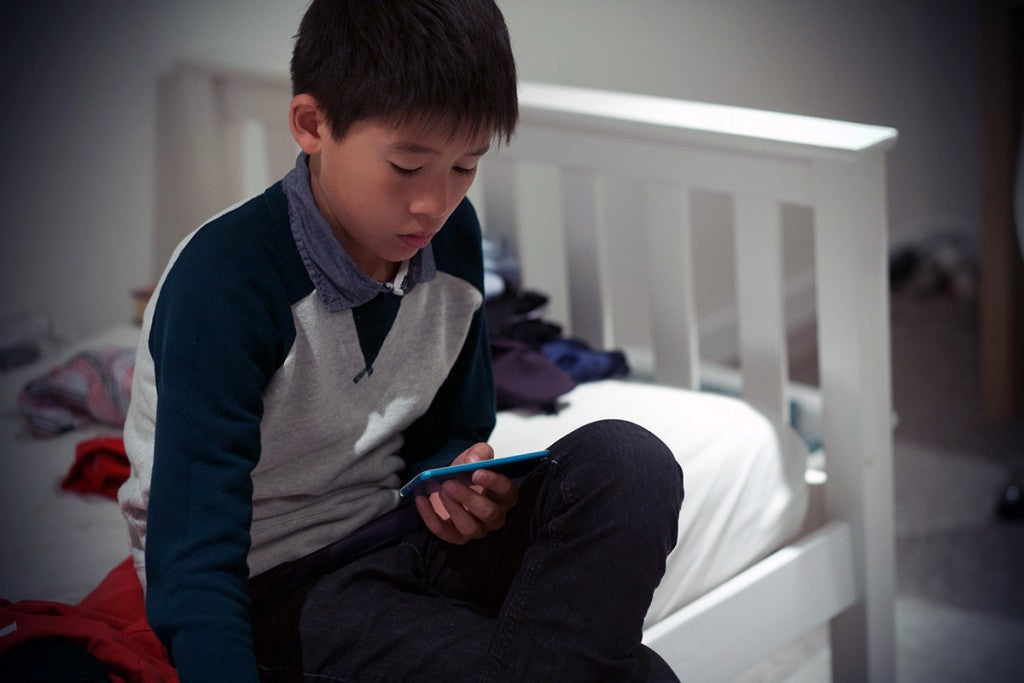
A Simple Solution for Screen-time Obsessed Kids
My kids are attracted to screens like zombies to uninfected humans. The mere sighting of a TV in the corner of a restaurant induces an instant trance state as they shuffle unconsciously towards the object of their obsession - oblivious to anything I'm saying.
Then again, I, their father & role model, am an iPhone-obsessed parent/entrepreneur who is dealing with the initial onset of repetitive strain injury from touch-screening or mouse-padding 8-10 hours a day.
Given the ubiquity of portable screens in today's hyper-connected world, I'm of the mind that some limits are indeed necessary for us habit-forming humans. But with everything else going on in our family’s daily lives, the last thing I need is another system to track and manage. (Have you, like I, ever tried to implement a points system, allowance checklist, or behaviour based rewards program - only to have your kid remind you a few weeks or months later “whatever happened to that system we were going to use….”?)
"With everything else going on in our family’s daily lives, the last thing I need is another system to track and manage."
Fortunately, we did put a single simple idea in place that seems to have been working out pretty well for us: no screen time on weeknights. (So, to be precise, Friday after school is a go, but Sunday evening is no-go). Yes, the kids do tend to over-indulge a bit on weekends - especially if the weather is lousy - but we haven't introduced any formal time limits. After a stretch of several uninterrupted hours, we will interrupt the screen-fest to insert an arbitrary recess but usually, there are enough scheduled weekend outings that it doesn't become all-consuming. Things can get a little murky around holidays, where we tend to relax restrictions, but we've been able to stick to the overall structure through the summer months where the kids camp schedule mirrors a school week.
Why it works:
The reason I believe this approach works for us is because it’s simple enough that I don't end up getting derailed by having to manage details. There’s nothing to monitor, so I don't have to deal with badgering, negotiating, or misunderstandings. Now every family is different, so I should probably provide some context: my kids are 5, 9 and 11, and we’ve pretty much had this in place from the get-go. In other words, they’re used to it and have long accepted that it’s the law. I appreciate that this may seem a bit radical for families that don't have such a policy in place - so I'll point out a few of the additional benefits that might encourage you to hold fast through the early resistance you will encounter as you try to squeeze the genie back into the bottle.
Benefit #1: My kids have raged against boredom - and emerged victorious
As a borderline ADD person, I relate to the anxiety that boredom causes. But I've also learned - with some mindfulness practice - that sitting with the discomfort can yield wonderfully unexpected results. So, when I see my kids pacing around the house in circles, I don't engage with their anxiety - I let it simmer with the knowledge that something interesting and creative will unfold. Sometimes it will just lead to drawing or reading a book, while at other times it involves one child engaging his or her siblings in the kind of rambunctious play that warms my paternal heart and makes our home feel chaotically alive."I've also learned - with some mindfulness practice - that sitting with the discomfort can yield wonderfully unexpected results."
Benefit #2: I've had to walk the talk and get more engaged.
No, I haven't swallowed the entire weeknight moratorium myself, and I think it's perfectly reasonable for parents to set rules for kids that don't necessarily apply to them (though some sort of explanation will inevitably be demanded- so I try to have an answer prepared in advance). I'm also not the kind of parent who feels obliged to constantly engage with my kids. But, given the structure we've set up, I do feel a sense of obligation to not mindlessly zone out (I have a weakness for news feeds) and have frequently been called out by my kids when I do. So, the weekday screen time moratorium is also an accountability system that forces me to counter my own self-indulgent urges and engage with my kids. I'll admit it: I find reading the New York Times many times more interesting than watching a 5-year-old climb a jungle gym but forcing myself to get present to my daughter's joy at playing a game of make-believe is priceless and makes me feel good in a way that a hit of info-endorphins never will."School nights are for reading, physical play and homework, which they accept as the norm."
Benefit #3: Learning the value of Leisure Time
It would be a stretch to say that our kids are strictly business during the week. However, they have developed a healthy distinction between leisure days and work days. School nights are for reading, physical play and homework, which they accept as the norm - rather than 5 nights of deprivation. Come Friday, they feel a heightened excitement upon arriving home and knowing they've earned the opportunity to indulge in pure escapist fun. I hope that this teaches them the value of delayed gratification and establishes a rhythm early on that will stick with them for the rest of their life.Conclusions
Screen time is an unavoidable aspect of modern life, and there is a growing evidence that not imposing limits can harm children's long-term development. However, a program of total abstinence is unrealistic (not to mention hypocritical) for most smartphone-toting parents.
Managing access can be so complex and emotionally fraught for families that a simple system works best. By imposing a complete moratorium on school nights, we've been able to strike a balance that works for our family and has had the added benefit of forcing me to confront my own bad habits, while still allowing the children to indulge at appropriate times.





Leave a comment
This site is protected by hCaptcha and the hCaptcha Privacy Policy and Terms of Service apply.